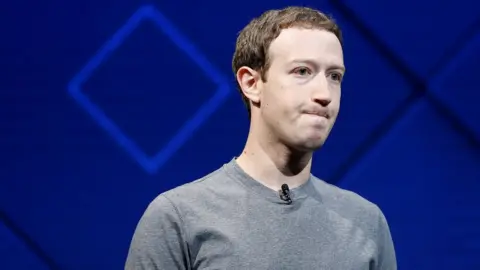Facebook reveals Mark Zuckerberg's US Congress testimony
 Reuters
ReutersMark Zuckerberg has revealed his planned testimony to the US Congress, ahead of answering questions during a two day hearing about data privacy.
The Facebook founder will speak about the Cambridge Analytica data scandal, Russian election interference and what the company is doing to prevent future incidents.
He will say the firm's new investment in security will affect its profits.
"Protecting our community is more important," he adds.
On the subject of users' data, he will say that every app that had access to a large amount of Facebook data prior to 2014 will be investigated. He said privacy controls had been made easier to understand.
Mr Zuckerberg also admits that Facebook was slow to spot Russian meddling.
Over a two year period, 126 million people were estimated to have seen Facebook content by the Internet Research Agency, a Russian propaganda organisation, he said.
However, Facebook has since developed better AI tools to shut down fake accounts, he will tell Congress.
Advertising policies have also been amended to include identity checks on advertisers wishing to run political ads, and people who run pages with large followings.
"My top priority has always been our social mission of connecting people, building community," Mr Zuckerberg said.
"Advertisers and developers will never take priority over that as long as I'm running Facebook."

Analysis: Dave Lee, BBC North America Technology Reporter
What is missing from this statement, and likely to be asked by lawmakers, is why it took a newspaper to discover this breach of Facebook's systems.
And, once Facebook knew, why it didn't notify the public and regulators immediately - instead of doing everything it could to block the story.
The measures put out by Facebook in recent days are good, common sense ideas - such as disabling data sharing with any app you don't use for more than three months.
By why did it take so long? Why weren't these protections built-in in the first place?
Mark Zuckerberg is going to try and highlight the good things Facebook has brought to our lives, of which there are many.
But I don't expect US representatives to give him too much credit for that - not this week, anyway.
